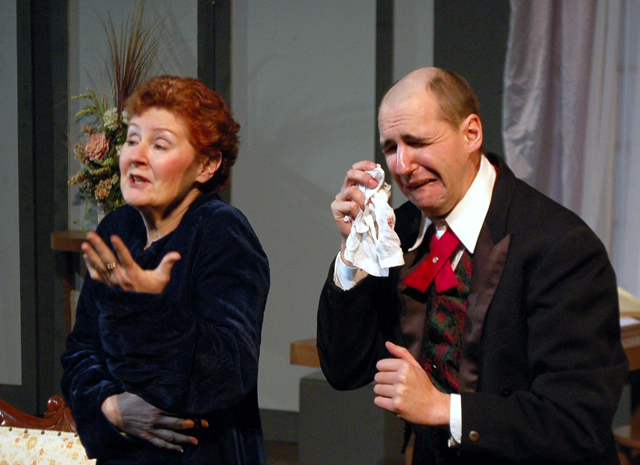
This was another play of the Boardmore’s season that I have absolutely no prior experience with or knowledge about (other than talking with the director and some of the cast). That would turn out to be a good thing with this play. It was like a carnival ride where, if you’re not expecting something, it’s all the more interesting and exciting. The play had so much to it—jam-packed into a two-hour show—that every twist and turn was as unexpected as the last. This can, however, be a drawback—if you don’t catch everything that just happened, you’ll find it difficult to understand what is happening now. Even a misheard word can create some confusion. That being said, the story is not an overly complicated one; it can essentially be boiled down to being in the wrong place at the wrong time. Times ten. Everyone ends up in the wrong place at the wrong time (and with a nineteen person cast, that’s a lot of wrong places at a lot of wrong times).
The wrong place is the lovely/disreputable Hotel Paradiso where—through a series of misunderstandings, plans-gone-awry, and plain bad luck—almost everyone ends up. This could have come across as incredibly contrived and overly coincidental, but instead it was spot on. Everyone in every scene was in the right spot to get the wrong information, so it all just happened to work out that way in a completely plausible way. I love when people in the background of a scene—people who were presumed removed and exited from the scene—keep the act up, separate from what the new focus is. It can be distracting, but in this play it just came across as natural. Well, as natural as a farce can be.
Now, when I said this play was fast, I mean just that. If there was one second between one person talking and the next person talking (in completely unrelated situations mind you), that would have seemed like an exaggerated pause. No, this play moved at such an incredible pace that the sheer task of “you have to be here at this exact point” must have taken several rehearsals in itself. Split-second timing. No sooner did the door shut behind one actor than the next actor, who if seen by the first would be in quite the predicament, made an appearance. This was one tight ship, so kudos to director Bruce Cathcart for keeping it that way.
The acting by the leads in this play was quite well done, mostly because the two couples could have merely been mirror images of one another; however the choices of the actors made them shine as individuals. Now the play was not what I would call ‘slap-stick’, but the almost constant state of movement from Scott Sharplin as Boniface put it pretty close to that fitting in that category. Not a move was wasted, and each one spoke volumes about the manic state of mind the character had to have been in to get himself into his situations. Each time he walked (or ran, or fell) on stage, the energy of the room went up greatly. His counterpart, Cot—played by George MacKenzie—came across as almost a bully, but in the most dignified manner; constantly trying to prove those around him wrong (or at least himself right). Joanne Cantwell played Boniface’s wife Angelique as a woman who was very unaware of the brashness that she gave off constantly. If the play had a villain, she would be it; the type of strong, opinionated character you just hope gets taken down a peg. Finally, Marcelle, the wife of Cot (played by Josie Sobol)—a wronged wife who doesn’t really know who’s wronging her more; a flustered woman who got too wrapped up in logic and ended up in way over her head.
As much as I enjoyed the leads, the play would not have been half as enjoyable without the ensemble surrounding them. Usually, they were in pairs and played off one another magnificently. The pair of hotel employees: Greg Woodford as the Italian owner—calm, sophisticated, and downright slimy, and David Hutchinson as his Cockney bellboy who seemed so run down that with each new task he was given I expected a collapse. Another notable pair was M. Martin (played by Jonathan Collins) and his lovely daughters who were what I can only describe as a mass of people coming across as one entity. Both Collins and his daughters were the most innocently frustrating characters in the whole story (which really is saying something) and added greatly to the overall chaos. Somehow, through all the door-slamming, running-around, false-identities, sneaking and stuttering, everything comes together and ties up rather nicely in the end. Everyone gets exactly what they deserve—though, I won’t say exactly what all of that is. It must be seen to be fully understood. The play runs for the remainder of the week at the Boardmore Playhouse, CBU, and I highly recommend it. I myself will be seeing it again to catch anything I may have missed the first time.
Hopefully I’ll get my regular seat.
PS – the only thing that came across as out of place in the whole evening was the pre-set/intermission music. Kenny G. Sax solos seemed kind of odd for turn-of-the-century France, but perhaps there was a reason behind it.

